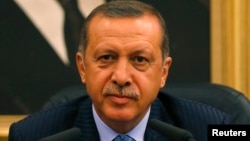ISTANBUL —
Turkish Prime Minister Recep Tayyip Erdogan has been at the forefront of condemnation of the overthrow of Egyptian President Mohamed Morsi, which he has blamed on an international conspiracy. Erdogan has been touring his electoral strongholds and speaking at mass rallies. He warns that Turkey also could be the victim of such a plot. Observers say his stance could be a sign Ankara is preparing to take a firm stance against any future unrest.
"Today it is Egypt, tomorrow they may want to unsettle Turkey because they don't want a strong Turkey in this region," he said at a meeting in the city of Bursa earlier this month. "Don't forget everyone has a trap, but the grandest is God Almighty's trap," he added.
Erdogan's ruling AKP party has its roots in political Islam and close political ties with Egypt's Muslim Brotherhood.
Fears, assertions
Sinan Ulgen, a visiting scholar at Carnegie Europe in Brussels, said the overthrow of the Egyptian president by his army had a strong impact on Erdogan.
"Given the history of the conflict in Turkey between the ruling party - the AKP - and the military, and the eventual successful domestication of the military's political influence, it's certainly very natural for Erdogan to adopt this line in Egypt, seeing a democratically elected government being ousted by the military," said Ulgen.
Erdogan repeatedly has claimed the overthrow of the Egyptian president was part of an international conspiracy against political Islam. The Turkish prime minister claims a similar conspiracy was behind weeks of protests sparked by his government's plans to redevelop Istanbul's Gezi Park.
Semih Idiz, a diplomatic columnist for the Turkish newspaper Taraf, said with Turkey facing crucial elections next year, playing the conspiracy card could be a shrewd move by Erdogan.
"He can keep his constituency, and make sure that there is no splits and divisions within his party, by [using] this siege mentality - [saying that] 'we are under siege, we have to remain solid at the moment.' And one way of doing that is twanging the chords that go down well with his Islamic grassroots supporters," said Idiz.
Anti-terror laws
Mass protests in the name of democracy preceded the military's ouster of Egypt's president. Given that, warns Soli Ozel, an international relations professor at Istanbul's Kadir Has University, Erdogan will view any repeat of anti-government protests in Turkey as a direct, anti-democratic threat to his rule, and likely will authorize a severe crackdown by security forces.
"Should there be a Gezi-type demonstration or wave of demonstrations in the country, the response is going to be pretty harsh, I think. And all that Egypt analogy is getting to serve as the legitimating narrative of it," said Ozel.
The Turkish government already has introduced regulations banning political slogans from being chanted at concerts or sporting events. The government also has warned that its severe anti-terror laws could be used against protestors. Despite such threats, analysts say that with students returning to schools and universities in September, fresh unrest could be in the offing.
"Today it is Egypt, tomorrow they may want to unsettle Turkey because they don't want a strong Turkey in this region," he said at a meeting in the city of Bursa earlier this month. "Don't forget everyone has a trap, but the grandest is God Almighty's trap," he added.
Erdogan's ruling AKP party has its roots in political Islam and close political ties with Egypt's Muslim Brotherhood.
Fears, assertions
Sinan Ulgen, a visiting scholar at Carnegie Europe in Brussels, said the overthrow of the Egyptian president by his army had a strong impact on Erdogan.
"Given the history of the conflict in Turkey between the ruling party - the AKP - and the military, and the eventual successful domestication of the military's political influence, it's certainly very natural for Erdogan to adopt this line in Egypt, seeing a democratically elected government being ousted by the military," said Ulgen.
Erdogan repeatedly has claimed the overthrow of the Egyptian president was part of an international conspiracy against political Islam. The Turkish prime minister claims a similar conspiracy was behind weeks of protests sparked by his government's plans to redevelop Istanbul's Gezi Park.
Semih Idiz, a diplomatic columnist for the Turkish newspaper Taraf, said with Turkey facing crucial elections next year, playing the conspiracy card could be a shrewd move by Erdogan.
"He can keep his constituency, and make sure that there is no splits and divisions within his party, by [using] this siege mentality - [saying that] 'we are under siege, we have to remain solid at the moment.' And one way of doing that is twanging the chords that go down well with his Islamic grassroots supporters," said Idiz.
Anti-terror laws
Mass protests in the name of democracy preceded the military's ouster of Egypt's president. Given that, warns Soli Ozel, an international relations professor at Istanbul's Kadir Has University, Erdogan will view any repeat of anti-government protests in Turkey as a direct, anti-democratic threat to his rule, and likely will authorize a severe crackdown by security forces.
"Should there be a Gezi-type demonstration or wave of demonstrations in the country, the response is going to be pretty harsh, I think. And all that Egypt analogy is getting to serve as the legitimating narrative of it," said Ozel.
The Turkish government already has introduced regulations banning political slogans from being chanted at concerts or sporting events. The government also has warned that its severe anti-terror laws could be used against protestors. Despite such threats, analysts say that with students returning to schools and universities in September, fresh unrest could be in the offing.











